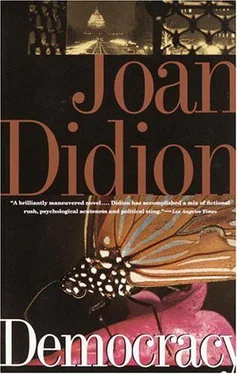I suppose one reason the tape was played again and again was simply that it remained the most recent film available on Inez Victor.
I suspect another reason was that the hat with the red cherries and “Just a private citizen” and “Marvelous” and “Isn’t It Romantic” offered an irony accessible to even the most literal viewer.
Three weeks later a Washington Post reporter happened to discover in the Pentagon bureau of records that the reason Jack Lovett had not answered his congressional subpoena was that he had been dead since August, buried in fact on government property, and that the signature on the government forms authorizing his burial on government property was Inez Victor’s.
That night the tape ran twice more, and then not again.
At any rate not again that I knew about, not even when NBC located Inez Victor at the refugee administration office in Kuala Lumpur and Inez Victor declined to be interviewed.
In March of 1976 Billy Dillon showed me the thirteen-word reply he got to a letter he had written Inez. He had resorted to writing the letter because calling Inez had been, he said, unsatisfactory.
“Raise anything substantive on the telephone,” Billy Dillon said when he showed me Inez’s reply, “Mother Teresa out there says she’s wanted in the clinic. So I write. I give her the news, a little gossip, a long thought or two, I slip in one question. One. I ask if she can give me one fucking reason she’s in goddamn K.L., and this is what I get. Thirteen words.”
He handed me the sheet of lined paper on which, in Inez’s characteristic scrawl, the thirteen words appeared: “ Colors, moisture, heat, enough blue in the air. Four fucking reasons. Love, Inez. ”
Colors, moisture, heat.
Enough blue in the air.
I told you the essence of that early on but not the context, which has been, you will note, the way I tried to stay on the wire in this novel of fitful glimpses. It has not been the novel I set out to write, nor am I exactly the person who set out to write it. Nor have I experienced the rush of narrative inevitability that usually propels a novel toward its end, the momentum that sets in as events overtake their shadows and the cards all fall in on one another and the options decrease to zero.
Perhaps because nothing in this situation encourages the basic narrative assumption, which is that the past is prologue to the present, the options remain open here.
Anything could happen.
As you may or may not know Billy Dillon has a new candidate, a congressman out of NASA who believes that his age and training put him on the right side of what he calls “the idea lag,” and occasionally when Billy Dillon is in California to raise money I have dinner with him. In some ways I have replaced Inez as the woman Billy Dillon imagines he wishes he had married. Again as you may or may not know Harry Victor is in Brussels, special envoy to the Common Market. Adlai and Jessie are both well, Adlai in San Francisco, where he clerks for a federal judge on the Ninth Circuit; Jessie in Mexico City, where she is, curiously enough, writing a novel, and living with a Newsweek stringer who is trying to log in enough time in various troubled capitals to come back to New York and go on staff. When and if he does I suspect that Jessie will not come up with him, since her weakness is for troubled capitals. Imagine my mother dancing , I had hoped that Jessie’s novel would begin, but according to a recent letter I had from her this particular novel is an historical romance about Maximilian and Carlota.
Inez of course is still in Kuala Lumpur.
She writes once a week to Jessie, somewhat less often to Adlai, and scarcely at all now to Harry. She sends an occasional postcard to Billy Dillon, and the odd clipping to me. One evening a week she teaches a course in American literature at the University of Malaysia and has dinner afterwards at the Lake Club, but most of her evenings as well as her days are spent on the administration of what are by now the dozen refugee camps around Kuala Lumpur.
A year ago when I was in London the Guardian ran a piece about Southeast Asian refugees, and Inez was quoted.
She said that although she still considered herself an American national (an odd locution, but there it was) she would be in Kuala Lumpur until the last refugee was dispatched.
Since Kuala Lumpur is not likely to dispatch its last refugee in Inez’s or my lifetime I would guess she means to stay on, but I have been surprised before. When I read this piece in London I had a sudden sense of Inez and of the office in the camp and of how it feels to fly into that part of the world, of the dense greens and translucent blues and the shallows where islands once were, but so far I have not been back.
Joan Didion was born in California and lives in New York City. She is the author of five novels and seven previous books of nonfiction, including The Year of Magical Thinking . Her collected nonfiction, We Tell Ourselves Stories in Order to Live , was published by Everyman’s Library in September 2006.












